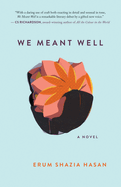
 Canadian author Erum Shazia Hasan explores the complex moral and ethical quandaries facing a humanitarian aid worker in her powerful debut novel, We Meant Well. The setting is Likanni, a village in an unnamed country, a former French colony characterized by lush beauty, poverty and war, and the narrator is Maya, a 30-something from Los Angeles who works for an international charitable organization based in Geneva, one that is recognizable by its "fancy blue logo."
Canadian author Erum Shazia Hasan explores the complex moral and ethical quandaries facing a humanitarian aid worker in her powerful debut novel, We Meant Well. The setting is Likanni, a village in an unnamed country, a former French colony characterized by lush beauty, poverty and war, and the narrator is Maya, a 30-something from Los Angeles who works for an international charitable organization based in Geneva, one that is recognizable by its "fancy blue logo."
Hasan's protagonist is a woman with immense empathy who chafes at the severely restricted donor-friendly scope of her job, which is simply to focus on running the charity's orphanage and not concern herself with underlying problems plaguing the village. With her heart not fully healed from a doomed love affair with a fellow aid worker, she finds herself stuck in a sterile marriage to a well-to-do lawyer. Maya was adopted as an infant from Bangladesh by a wealthy American couple, and grew up a white girl trapped in a brown body with no understanding of her heritage and roots. As a mother, the gaping holes in her life's narrative sap her maternal confidence.
Maya oversees operations in Likanni from her luxury perch in the Hollywood Hills until she is summoned to the village by her superiors to investigate a rape allegation against one of her colleagues, Marc. Protestors surround the charity's office, demanding justice. A public relations fiasco would affect donations to the organization, and Maya is instructed to "be responsive to the aggrieved beneficiaries while protecting the brand."
We Meant Well follows its narrator as she returns to picturesque and impoverished Likanni, where she spent many years working. Maya is devastated to learn that the rape victim is Lele, her protégée and employee. Lele, the daughter of the village chief, has transformed from a bright, happy young woman to a bed-ridden shadow of her former self. Clearly she has suffered an immense trauma. And she is pregnant.
Readers may question Maya's choices as she tries to untangle the truth of what happened to Lele while facing bureaucratic pressure to evacuate Marc and quickly resolve the crisis. As We Meant Well reaches its dramatic, unexpected climax, Maya has to make a split-second decision that will have lasting effect for all concerned. Hasan tantalizes readers: she opts not for a neat and tidy ending, but instead positions her characters for a destiny-defining reckoning beyond the page. --Shahina Piyarali, reviewer
Shelf Talker: A humanitarian aid worker at an international charity is faced with an impossible choice when one of her colleagues is accused of rape by a village chief's daughter.

